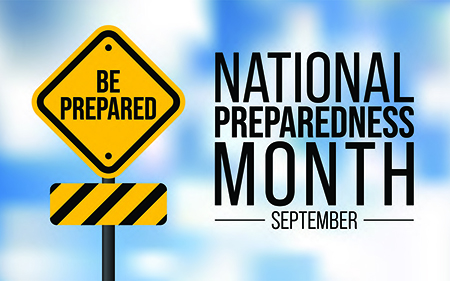Prepared, not scared: Get ahead of whatever Mother Nature has in store next
Forty-eight hours.
That was how long Ali Shah had been director of the San Jacinto College Office of Emergency Management when Hurricane Harvey started pummeling Houston. Shah calls his job orientation "trial by hurricane."
Four years have passed, but Mother Nature continues to show she has a few tricks up her sleeve with Tropical Storm Imelda making a U-turn in 2019 and an Arctic front blanketing the Lone Star State this February.
Whether or not the disaster comes from Mother Nature, emergency preparedness is always in season. Since September is National Preparedness Month — and it's still hurricane season — Shah shares how you can prepare for the next disaster.
Adopt the mindset
Shah has navigated many disasters during his 22 years in public safety. Lesson learned: It's always best to have a plan — the earlier, the better.
"The [preparedness] mindset doesn't have to happen right when a hurricane is coming or when it's starting to get cold," Shah said.
Preparedness starts with asking yourself these two questions:
- How will I learn about emergencies?
- What are my specific needs?
First, know your reliable news sources — whether TV, radio, or text message alerts. You can even buy an NOAA emergency radio that broadcasts public alerts.
If you tend to stay out of the loop, ask a trusted friend or family member who gets alerts to call you immediately in an emergency.
Second, we all need food, water, and shelter. What special challenges do you face? Do you have health issues? Are you a single parent?
Now, do you have the resources to take care of yourself during a disaster, or would you need help?
Preparedness means you know how to take care of yourself before a disaster happens. Even if you can't do everything alone, you know how to direct family, friends, or emergency responders to help you.
Develop the plan
Once you know how you'll learn about emergencies and what your needs are, it's time to create the plan. Think beyond keeping water and nonperishable food on hand and your gas tank full.
Your plan should include these six steps:
1. Choose your evacuation spot.
If you need to evacuate (and Shah says you should when officials call for an evacuation), where would you go — a family member's home, statewide shelter, or community center? And how would you get there?
If you'll need help getting to a shelter or another location or accessing resources in an emergency, call 2-1-1 now to be added to a statewide/local registry. This registry lets emergency responders know who you are, where you live, and what help you need during disasters.
2. Don't forget Spot and Fluffy.
If you have pets, plan where you'll take them in an emergency. Share details about any pets if you register with 2-1-1. You may not be able to go to your nearest shelter, but pets are allowed in certain shelters. You can evacuate — and take your pets with you!
3. Extend your prescriptions.
If you take medication, talk to your doctor about getting an extra supply. If pharmacies close because of extended power outages, you won't be able to refill prescriptions.
4. Assemble a "go kit."
"Gather the things you need to sustain you from where you are to where you're getting evacuated," Shah said.
At minimum, put these items in a backpack or small storage tub:
- 1-2 changes of clothes, including shoes and underwear
- Printed contact information for your doctor, family, and friends
- Printed copies of your driver's license, Social Security card, and other identification sealed in a heavy-duty Ziploc bag
If you're checking in at a shelter, you'll need identifying information. Shah recommends storing the copies securely on a smartphone. (Or keep printed copies on you to avoid identity theft.)
Finally, slap a sticky note on the kit for last-minute items to add:
- Prescriptions
- Nonperishable snacks/food
- Pet food
- Water bottles
- Phone charger
5. Consider your mental health.
"Disasters can have a psychological toll as well as physical and financial," Shah said.
Have a good support system — know whom you can call if you feel overwhelmed. Besides family or friends, you can call 1-800-273-8255 (National Suicide Prevention Lifeline) or text "HOME" to 741741 (National Crisis Text Line).
6. Communicate your plan to family and friends.
Make this a group activity. Bring everyone together to plan so each person has ownership. Share what steps you've taken and where you want to evacuate. Problem-solve together.
Go the extra mile
Life circumstances are always changing, so review your plan often and update.
For extra credit, consider learning basic survival skills, including CPR and first aid. Check out first aid courses offered by San Jac's continuing and professional development division or county agencies.
If you feel overwhelmed about starting, tackle one step today — then another tomorrow. The important thing is to start.
As you create and work the plan, disasters will seem less daunting.
"When you start a plan and your plan matures, you deal with disaster the way you deal with any other hurdle in life," Shah said. "Knowing you have an answer to the problems you might face during a stressful time can keep a disaster from becoming your disaster."
If Googling is your thing
Visit these websites to learn more about emergency preparedness:
- Ready.gov: General information to prepare for emergencies
- Readyharris.org: Emergency preparation tips, real-time alerts, and local resources for residents in and around Harris County
- 211texas.org: State program that connects you to local emergency resources (call the free 2-1-1
hotline to be added to a registry if you need special resources/evacuation help during
disasters)

